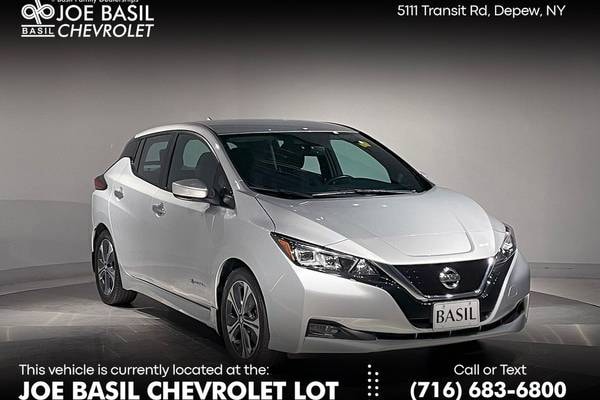Used 2018 Nissan LEAF Hatchback Consumer Reviews
Best City Car
Living in Toronto, short trips throughout the week is what we do. This is an incredibly practical car as it offers roominess, quiet (no acceleration noise) ride, very responsive, good on corners (low centre of gravity as EV battery weight is on the bottom of car), sits higher than a sedan (easier to climb into and out of) so feels more like an SUV, and is a hatchback (great for grocery loading and unloading) and seats fold down for hauling larger thing. Having the SL (highest trim) comes equipped with a very respectable Bose stereo system. I charge at home in the evening, similar to that is charging my phone and I don't have to touch never-cleaned gas pumps. A $1500 charger installation (optional) is the route we took as charging fully overnight is what we preferred over trickle charging (wall plug) which can take much longe. Cost of full charge is CAD $3.16 (40 kWh X $0.079). Because my commute doesn't require too much highway, I can charge the car once every few days, sometimes longer or shorter(depends on range used). As a side note, when I first bought the Leaf, I often accelerated enjoying the instant EV response and thus depleting battery range. After the novelty wore off, I drove it more sensibly so the economical value started to really show. Here's some quick math on its efficiency. If I drove 650km on a 45L tank of gas (say the car is pretty efficient at 6.9L / 100km), the cost would be about CAD $70 today. For the same range, I'd be paying under CAD $10. Also, when I paid for gas inside the station, I'd be tempted to buy salty/sweet/caffeinated things. A different way to think about the fuel economy is for 100 kms of distance in an efficient gas car, it would cost $10.73 ($1.55/L x 6.9) vs. the Leaf at $1.46 ($0.01456/km)! The braking system is also fantastic. You barely use brakes as most of the time you're slowing or coming to a compete stop (even on hills) with the electric regenerative braking system (doesn't use brakes to slow). Brake pads last much longer as a result and this method of braking is intuitively easy. And despite posts for other EVs, like Teslas, requiring more frequent tire changes (probably due to greater acceleration-thrill factor) I didn't experience noticeable faster-wear on my Leaf compared with my gas cars. Like most people, I have a busy life and having to make time for oil changes and all the regular maintenance things for gas cars is something I could live without. It's not just the actual time it takes to change the oil and filter (or other fluids, belts, etc.), it's also the scheduling and/or waiting around, the transaction, and all the micro activities needed here. Since EVs don't require maintenance like gas cars, you go from something that seems fairly high-maintenance to something that's low. I value the time saving. Canadian winters are cold and EVs have reduced range when temperatures drop below zero. Still, 170 kms - 190 kms is just fine for me for local driving. As well, you control your cabin temperature with your phone and the car heats up almost immediately (unlike gas cars). Nice to hop into a warm car in the winter. The standard driver warning system (frontal collission, blind spot detection, etc.) work well. The lane assist and adaptive cruise control are helpful. Battery life of our Leaf, now going on 6 years (2018) is surprising impressive. The range decrease of the battery is minimal and the battery health has all the bars despite bing 6 years old and having over 100k on the odometer! I hear of cases where EV batteries need to be replaced and these tend to scare many interested EV buyers in general. In my view, as with all cars, in most cases of faulty batteries are likely a result of poor car given to the car. If DC (high current rapid charge method) is frequently used, this heats up the battery each time and accelerates battery age (same as using rapid charges regularly with a phone). Charging at home preserves the life of the battery-- batteries have really surpassed consumer expectations on how long they last and how minimal and slow degradation occurs with normal use. Now that these cars in the used market are under CAD $20k, they are very affordable for most and their maintenance is extremely low. Consider the Leaf if you're looking for a used no-vibration, quiet, comfortable, safe, dependable and good-handling city car! We intend to drive our Leaf for many more years to come! Btw, for what it's worth, i am a car guy I used to drive Porsche Cayennes and other performance cars. Hope this helps!
- Safety
- Technology
- Performance
- Interior
- Comfort
- Reliability
- Value



